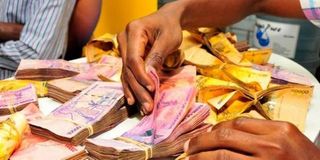Ex-Nwoya CAO refunds PDM cash

What you need to know:
- While handing over the money at Arua City Central Police Station on Wednesday, Mr Leru, who is now the Obongi District CAO, said the money had been used to handle administrative costs.
The former Nwoya District Chief Administrative Officer (CAO), Mr Andrew Leru, has handed over Shs30.6 million to the Parish Development Model (PDM) secretariat.
The money, which was meant for the Nwoya District PDM project, had allegedly been misused by the district officials.
However, while handing over the money at Arua City Central Police Station on Wednesday, Mr Leru, who is now the Obongi District CAO, said the money had been used to handle administrative costs.
“We realised that there was an omission on our part and we have worked hard to ensure that it is put back because that is what goes to the revolving fund,” he said.
He added: “I have done it as an example and I encourage my colleagues in the service where there was that omission that they should do the same.”
Mr Leru used his own money to refund the cash.
The deputy director of the PDM secretariat, Ms Jovin Kalisa, said the money was part of the PDM revolving fund which is supposed to go to the Savings and Credit Cooperative Organisations (Saccos) formed by the people to get them out of a subsistence economy.
“I am glad that we have recovered money for the people of Nwoya District,” she said, adding that Mr Leru may be the last person they were looking for to refund the revolving fund money.
Ms Kalisa, however, castigated the resident district commissioner of Obongi for trying to block them from arresting Mr Leru from Obongi district earlier.
She said the CAO should have been at the forefront of fighting corruption.
In August last year, Ms Kalisa and her team arrested 14 district officials across the country for misappropriating PDM funds worth Shs526 million.
ABOUT PDM
PDM is a new poverty alleviation programme that the government rolled out in the last financial year to get more than three million peasant households into the money economy.
It is fashioned to operate through Savings and Credit Cooperative Organisations (Saccos) formed by residents in each of Uganda’s parishes. The beneficiaries select profitable enterprises that the government bankrolls.




